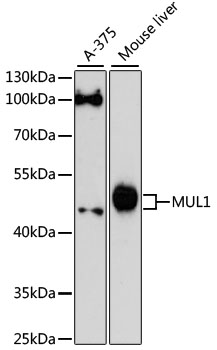E3 ubiquitin protein ligase MUL1 (MUL1) Rabbit Polyclonal Antibody
Other products for "MUL1"
Specifications
| Product Data | |
| Applications | WB |
| Recommended Dilution | WB,1:1000 - 1:2000 |
| Reactivities | Human, Mouse |
| Modifications | Unmodified |
| Host | Rabbit |
| Isotype | IgG |
| Clonality | Polyclonal |
| Immunogen | Recombinant fusion protein containing a sequence corresponding to amino acids 1-352 of human MUL1 (NP_078820.2). |
| Formulation | Buffer: PBS with 0.02% sodium azide,50% glycerol,pH7.3. |
| Concentration | lot specific |
| Purification | Affinity purification |
| Conjugation | Unconjugated |
| Storage | Store at -20℃. Avoid freeze / thaw cycles. |
| Stability | Shelf life: one year from despatch. |
| Predicted Protein Size | 39kDa |
| Gene Name | mitochondrial E3 ubiquitin protein ligase 1 |
| Database Link | |
| Background | Exhibits weak E3 ubiquitin-protein ligase activity. E3 ubiquitin ligases accept ubiquitin from an E2 ubiquitin-conjugating enzyme in the form of a thioester and then directly transfer the ubiquitin to targeted substrates. Can ubiquitinate AKT1 preferentially at 'Lys-284' involving 'Lys-48'-linked polyubiquitination and seems to be involved in regulation of Akt signaling by targeting phosphorylated Akt to proteosomal degradation. Mediates polyubiquitination of cytoplasmic TP53 at 'Lys-24' which targets TP53 for proteasomal degradation, thus reducing TP53 levels in the cytoplasm and mitochondrion. Proposed to preferentially act as a SUMO E3 ligase at physiological concentrations. Plays a role in the control of mitochondrial morphology by promoting mitochondrial fragmentation, and influences mitochondrial localization. Likely to promote mitochondrial fission through negatively regulating the mitochondrial fusion proteins MFN1 and MFN2, acting in a pathway that is parallel to the PRKN/PINK1 regulatory pathway. May also be involved in the sumoylation of the membrane fission protein DNM1L. Inhibits cell growth. When overexpressed, activates JNK through MAP3K7/TAK1 and induces caspase-dependent apoptosis. Involved in the modulation of innate immune defense against viruses by inhibiting DDX58-dependent antiviral response. Can mediate DDX58 sumoylation and disrupt its polyubiquitination. |
| Synonyms | C1orf166; FLJ12875; GIDE; MAPL; MULAN; RNF218; RP11-401M16.2 |
| Reference Data | |
Documents
| Product Manuals |
| FAQs |
| SDS |
{0} Product Review(s)
0 Product Review(s)
Submit review
Be the first one to submit a review
Product Citations
*Delivery time may vary from web posted schedule. Occasional delays may occur due to unforeseen
complexities in the preparation of your product. International customers may expect an additional 1-2 weeks
in shipping.






























































































































































































































































 Germany
Germany
 Japan
Japan
 United Kingdom
United Kingdom
 China
China



